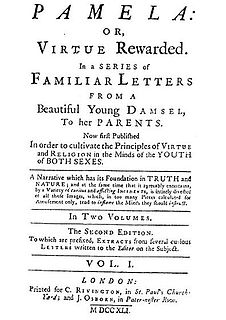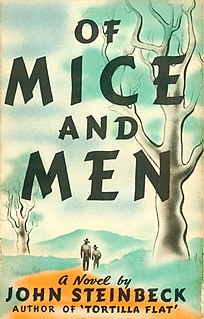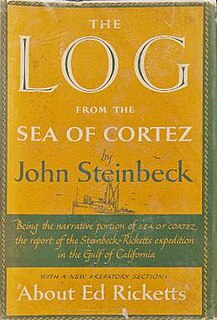
An epistolary novel is a novel written as a series of documents. The usual form is letters, although diary entries, newspaper clippings and other documents are sometimes used. Recently, electronic "documents" such as recordings and radio, blogs, and e-mails have also come into use. The word epistolary is derived from Latin from the Greek word ἐπιστολή epistolē, meaning a letter.

John Ernst Steinbeck Jr. was an American author. He won the 1962 Nobel Prize in Literature "for his realistic and imaginative writings, combining as they do sympathetic humour and keen social perception." He has been called "a giant of American letters," and many of his works are considered classics of Western literature.
Political fiction employs narrative to comment on political events, systems and theories. Works of political fiction, such as political novels, often "directly criticize an existing society or present an alternative, even fantastic, reality". The political novel overlaps with the social novel, proletarian novel, and social science fiction.

The Grapes of Wrath is an American realist novel written by John Steinbeck and published in 1939. The book won the National Book Award and Pulitzer Prize for fiction, and it was cited prominently when Steinbeck was awarded the Nobel Prize in 1962.

Of Mice and Men is a novella written by John Steinbeck. Published in 1937, it tells the story of George Milton and Lennie Small, two displaced migrant ranch workers, who move from place to place in California in search of new job opportunities during the Great Depression in the United States.

East of Eden is a novel by Nobel Prize winner John Steinbeck, published in September 1952. Often described as Steinbeck's most ambitious novel, East of Eden brings to life the intricate details of two families, the Trasks and the Hamiltons, and their interwoven stories. The novel was originally addressed to Steinbeck's young sons, Thom and John. Steinbeck wanted to describe the Salinas Valley for them in detail: the sights, sounds, smells and colors.

East of Eden is a 1955 drama film, directed by Elia Kazan, and loosely based on the fourth and final part of the 1952 novel of the same name by John Steinbeck. It is about a wayward young man who, while seeking his own identity, vies for the affection of his deeply religious father against his favored brother, thus retelling the story of Cain and Abel.

To a God Unknown is a novel by John Steinbeck, first published in 1933. The book was Steinbeck's third novel. Steinbeck found To a God Unknown extremely difficult to write; taking him roughly five years to complete, the novel proved more time-consuming than either East of Eden or The Grapes of Wrath, Steinbeck's longest novels.

Travels with Charley: In Search of America is a 1962 travelogue written by American author John Steinbeck. It depicts a 1960 road trip around the United States made by Steinbeck, in the company of his standard poodle Charley. Steinbeck wrote that he was moved by a desire to see his country on a personal level because he made his living writing about it. He wrote of having many questions going into his journey, the main one being "What are Americans like today?" However, he found that he had concerns about much of the "new America" he witnessed.

The Winter of Our Discontent is John Steinbeck's last novel, published in 1961. The title comes from the first two lines of William Shakespeare's Richard III: "Now is the winter of our discontent / Made glorious summer by this sun [or son] of York".

Edward Flanders Robb Ricketts commonly known as Ed Ricketts, was an American marine biologist, ecologist, and philosopher. He is best known for Between Pacific Tides (1939), a pioneering study of intertidal ecology, and for his influence on writer John Steinbeck, which resulted in their collaboration on the Sea of Cortez (1941), later republished as The Log from the Sea of Cortez (1951).
Croton oil is an oil prepared from the seeds of Croton tiglium, a tree belonging to the order Euphorbiales and family Euphorbiaceae, and native or cultivated in India and the Malay Archipelago. Small doses taken internally cause diarrhea. Externally, the oil can cause irritation and swelling. Croton oil is used in Phenol-croton oil chemical peels, due to its caustic exfoliating effects it has on the skin. Used in conjunction with phenol solutions, it results in an intense reaction which leads to initial skin sloughing. Since croton oil is very irritating and painful, it is used in laboratory animals to study how pain works, pain-relieving and anti-inflammatory drugs, and immunology.
Pascal Avram "Pat" Covici was a Romanian Jewish-American book publisher and editor, best known for his close associations with authors such as John Steinbeck, Saul Bellow, and many more noted American literary figures, many through his position at Viking Press.
Thomas Myles Steinbeck was a screenwriter, photographer, and journalist. He published numerous works of fiction, including short stories and novels. He was the elder son of American novelist John Steinbeck.

The Log from the Sea of Cortez is an English-language book written by American author John Steinbeck and published in 1951. It details a six-week marine specimen-collecting boat expedition he made in 1940 at various sites in the Gulf of California, with his friend, the marine biologist Ed Ricketts. It is regarded as one of Steinbeck's most important works of non-fiction chiefly because of the involvement of Ricketts, who shaped Steinbeck's thinking and provided the prototype for many of the pivotal characters in his fiction, and the insights it gives into the philosophies of the two men.
Paul Osborn was an American playwright and screenwriter. Osborn's original plays are The Vinegar Tree, Oliver Oliver, and Morning's at Seven and among his several successful adaptations, On Borrowed Time has proved particularly popular. He wrote the screenplays for East of Eden (1955) and South Pacific (1958), among other films.

Burning Bright is a 1950 novella by John Steinbeck written as an experiment with producing a play in novel format. Rather than providing only the dialogue and brief stage directions as would be expected in a play, Steinbeck fleshes out the scenes with details of both the characters and the environment. The intention was to allow the play to be read by the non-theatrical reader while still allowing the dialogue to be lifted and performed with little adaptation by acting companies. While Steinbeck could see that providing little information in the way of physical description or stage direction allowed the director and actors greater freedom and scope for imaginative interpretation, he weighed this against the benefit of making the players aware of the author's intent and making the play accessible to the general reader.
East of Eden is the biblical location of the Land of Nod where Cain was exiled.

Cathy Ames, later known as Kate Trask or Kate Albey, is a fictional character and the main antagonist in John Steinbeck's novel East of Eden. She is the wife of main protagonist Adam Trask, and the mother of his twin sons, Caleb and Aron. Beneath her charming, attractive facade, she is an evil woman who manipulates and destroys people for her own amusement and profit. Steinbeck characterizes her as a "psychic monster" with a "malformed soul".
McIntosh & Otis is a literary agency based in New York City. It was incorporated in 1928 by Mavis McIntosh and Elizabeth Otis. The agency handles literary estates and subsidiary rights for the authors that it represents.













